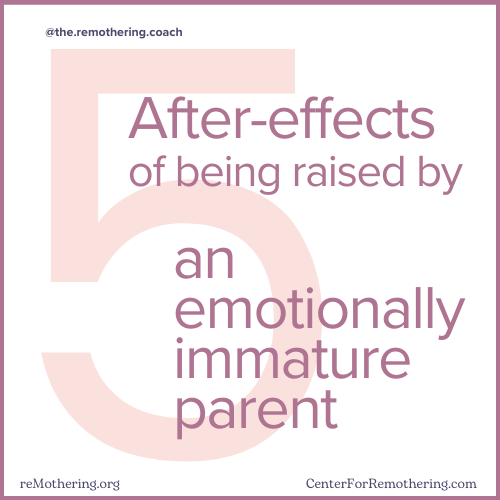5 After-Effects of Emotionally Immature Parenting
Identifying Common Struggles Faced by Adult Children of Emotionally Immature Parents
Growing up with an emotionally immature parent (EIP1) can leave lasting imprints on our psyche and behavior. These imprints often manifest in adulthood as struggles that can be challenging to navigate without understanding their origins. To that end, I thought it may be helpful to share the five most common after-effects2 that I’ve heard from folks in the reMothering.org community and at the Center for Remothering.
By identifying these struggles, we can begin to address and heal from the impact of our upbringing, fostering a path toward relief, clarity, and self-alignment.

5 Common After-Effects of Being Raised by an Emotionally Immature Parent
1. Guilt
Guilt manifests in various forms, such as guilt from outside-in obligations, guilt for prioritizing oneself, guilt for having preferences, and guilt for setting boundaries. This pervasive sense of guilt can hinder personal growth and self-acceptance.
2. Outside-In Adaptations
Outside-In Adaptations refer to behaviors like fixer, helper, achiever, perfectionist, people-pleaser, and reflexive caretaker. These adaptations often stem from scanning our environment to predict and meet external expectations rather than tending to our internal needs.
3. Unkind Self-Talk
Unkind self-talk can sound like a relentless inner task manager, a harshness, an inner critic. This inner voice can severely impact self-esteem and mental well-being, making it challenging to cultivate self-compassion.
4. Mental Chatter Conversations
Mental chatter conversations are distinct from unkind self-talk. They often feel like a conversation with someone else, even though it’s all happening in the privacy of our own mind. It can feel like our thoughts are being hijacked.
These mental chatter conversations can sound like an internalized voice that offers up less-than-uplifting quips, it can sound like pre-play or the replay of conversations with your mother or others, it may also sound like mental sparring in your own head trying to explain yourself to feel understood.
5. Boundary Challenges
Boundary Challenges include having a squishy understanding of what a boundary is. Or, even if we are clear about what a boundary is, boundary challenges also may show up as feeling like it’s not even worth it because the other person is so boundary-impaired they just aren’t hearing you. Boundary challenges may also show up as a fear of being perceived as unkind or heartless for setting them.
Embracing Neuroplasticity: The Good News
The cool news is that neuroplasticity is on our side. And while there isn’t “THE ONE RIGHT WAY” to heal, I have found that based on the results I’ve seen my clients experience as well as some of the beautiful emails I’ve received from reMothering Masterclass Course participants: the remothering work is certainly a path we can take towards relief, clarity and self-alignment.
Here’s to shedding any outdated adaptations and keeping the hard-earned wisdom!

From my heart to yours.
Your guide, coach, and fellow traveler on the remothering journey,
Simona Vivi H.
p.s. Do any of these after-effects resonate with you? I’d love to hear your thoughts.
Additional Resources
For more on Adult Children of Emotionally Immature Parents, check out:
- Are you an over-explainer, this may be why [article]
Featuring Lindsay C. Gibson, PsyD, psychologist and best selling author of Adult Children of Emotionally Immature Parents, Disentangling from Emotionally Immature People, and the upcoming Clinician’s Guide to Treating Adult Children of Emotionally Immature People - Subtle, Deniable Slights from Emotionally Immature Parents [YouTube clip]
with Simona Vivi H and Lindsay C. Gibson, PsyD - Quieting Harsh Self-Talk and Inner Task Managers [article]
- Do I have to Forgive My Mother [article]
For guidance, mentorship, and support along your remothering journey, check out:
- The reMothering Masterclass Course
A comprehensive, self-paced, online course - Coaching with Simona Vivi H
Visit CenterForRemothering.com to learn more
- The term Emotionally Immature Parent comes from the works of the incredible Lindsay C. Gibson, PsyD. Dr. Gibson is a psychologist and the best selling author of Adult Children of Emotionally Immature Parents, Disentangling from Emotionally Immature People, and the upcoming Clinician’s Guide to Treating Adult Children of Emotionally Immature People ↩︎
- The 5-common after-effects listed are the article’s author (Simona Vivi H) observations. This article is meant to highlight shared experiences of the remothering community; these are not clinical research findings. ↩︎